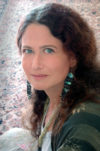On the Fifth Day
POETRY FORMAT, 24 Apr 2017
Jane Hirshfield – TRANSCEND Media Service
That common ground between poetry and science is what poet Jane Hirshfield sows with splendor in this poem written for the 2017 March for Science in Washington, D.C., protesting the anti-fact, anti-truth, anti-science political climate of the current American administration. (Maria Popova)
On the fifth day
the scientists who studied the rivers
were forbidden to speak
or to study the rivers.
The scientists who studied the air
were told not to speak of the air,
and the ones who worked for the farmers
were silenced,
and the ones who worked for the bees.
Someone, from deep in the Badlands,
began posting facts.
The facts were told not to speak
and were taken away.
The facts, surprised to be taken, were silent.
Now it was only the rivers
that spoke of the rivers,
and only the wind that spoke of its bees,
while the unpausing factual buds of the fruit trees
continued to move toward their fruit.
The silence spoke loudly of silence,
and the rivers kept speaking,
of rivers, of boulders and air.
In gravity, earless and tongueless,
the untested rivers kept speaking.
Bus drivers, shelf stockers,
code writers, machinists, accountants,
lab techs, cellists kept speaking.
They spoke, the fifth day,
of silence.
________________________________________
 Award-winning poet, essayist, and translator Jane Hirshfield is the author of several collections of verse, including The Beauty (2015), a finalist for the National Book Award, Come, Thief (2011), After (2006), shortlisted for the T.S. Eliot prize, and Given Sugar, Given Salt (2001), a finalist for the National Book Critics Award, among others. Hirshfield published her first poem in 1973, shortly after graduating from Princeton as a member of the university’s first graduating class to include women. She put aside her writing for nearly eight years, however, to study at the San Francisco Zen Center. “I felt that I’d never make much of a poet if I didn’t know more than I knew at that time about what it means to be a human being,” Hirshfield once said. “I don’t think poetry is based just on poetry; it is based on a thoroughly lived life. And so I couldn’t just decide I was going to write no matter what; I first had to find out what it means to live.”(Poetry Foundation)
Award-winning poet, essayist, and translator Jane Hirshfield is the author of several collections of verse, including The Beauty (2015), a finalist for the National Book Award, Come, Thief (2011), After (2006), shortlisted for the T.S. Eliot prize, and Given Sugar, Given Salt (2001), a finalist for the National Book Critics Award, among others. Hirshfield published her first poem in 1973, shortly after graduating from Princeton as a member of the university’s first graduating class to include women. She put aside her writing for nearly eight years, however, to study at the San Francisco Zen Center. “I felt that I’d never make much of a poet if I didn’t know more than I knew at that time about what it means to be a human being,” Hirshfield once said. “I don’t think poetry is based just on poetry; it is based on a thoroughly lived life. And so I couldn’t just decide I was going to write no matter what; I first had to find out what it means to live.”(Poetry Foundation)
This article originally appeared on Transcend Media Service (TMS) on 24 Apr 2017.
Anticopyright: Editorials and articles originated on TMS may be freely reprinted, disseminated, translated and used as background material, provided an acknowledgement and link to the source, TMS: On the Fifth Day, is included. Thank you.
If you enjoyed this article, please donate to TMS to join the growing list of TMS Supporters.

This work is licensed under a CC BY-NC 4.0 License.
It’s an excellent–timely and timeless–poem, with master craft and conceptualization. The language is deceptively simple–almost prosaic; but the assonance and consonance raise the level of common speech so that the reader wants to re-read, read aloud, and share.
Thanks to Maria Popova for sharing this here. Thanks to the TMS site for publicizing these truths.
And, for the poem, and her statement, much thanks to Jane Hirschfield:
“I don’t think poetry is based just on poetry; it is based on a thoroughly lived life. And so I couldn’t just decide I was going to write no matter what; I first had to find out what it means to live.”(Poetry Foundation)–Jane Hirschfield